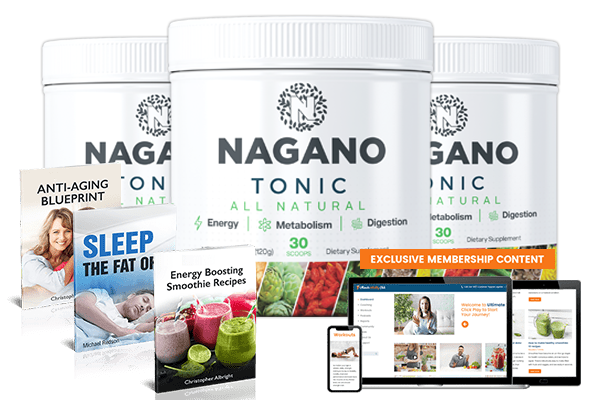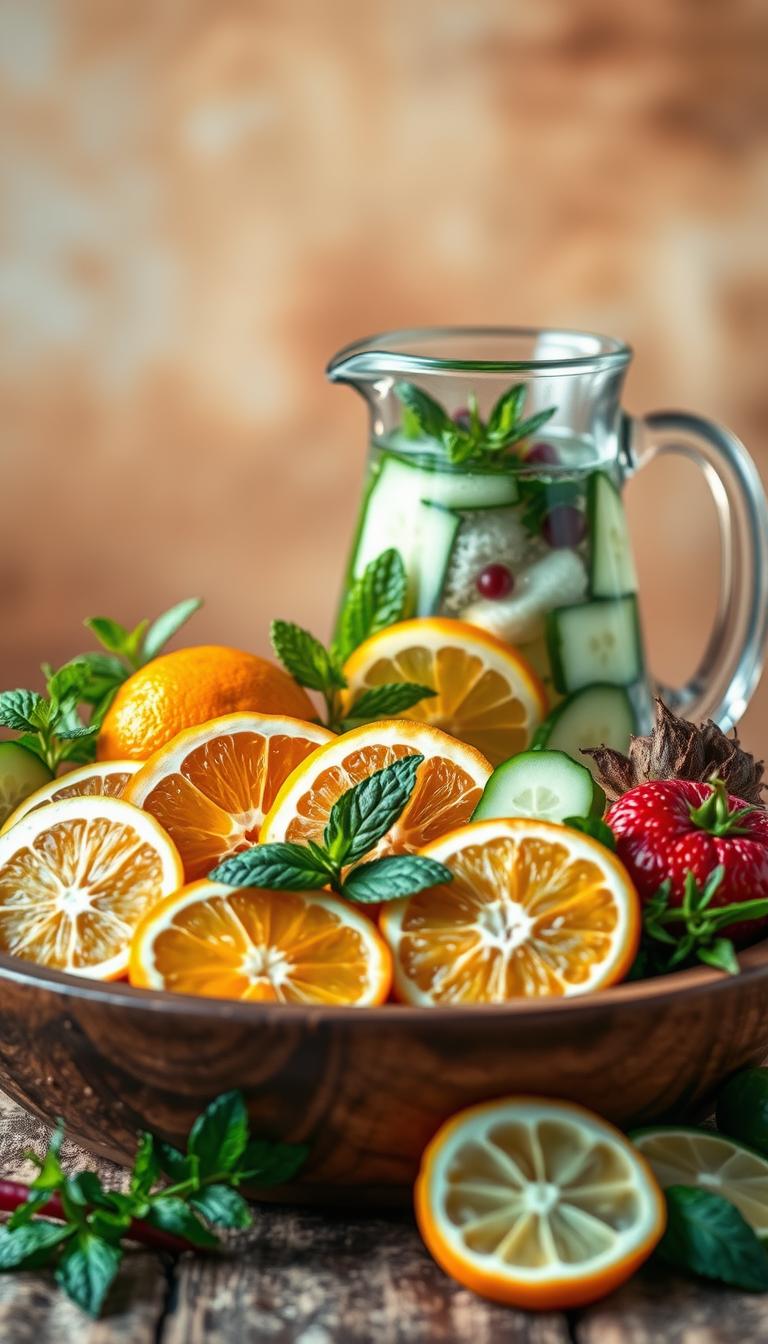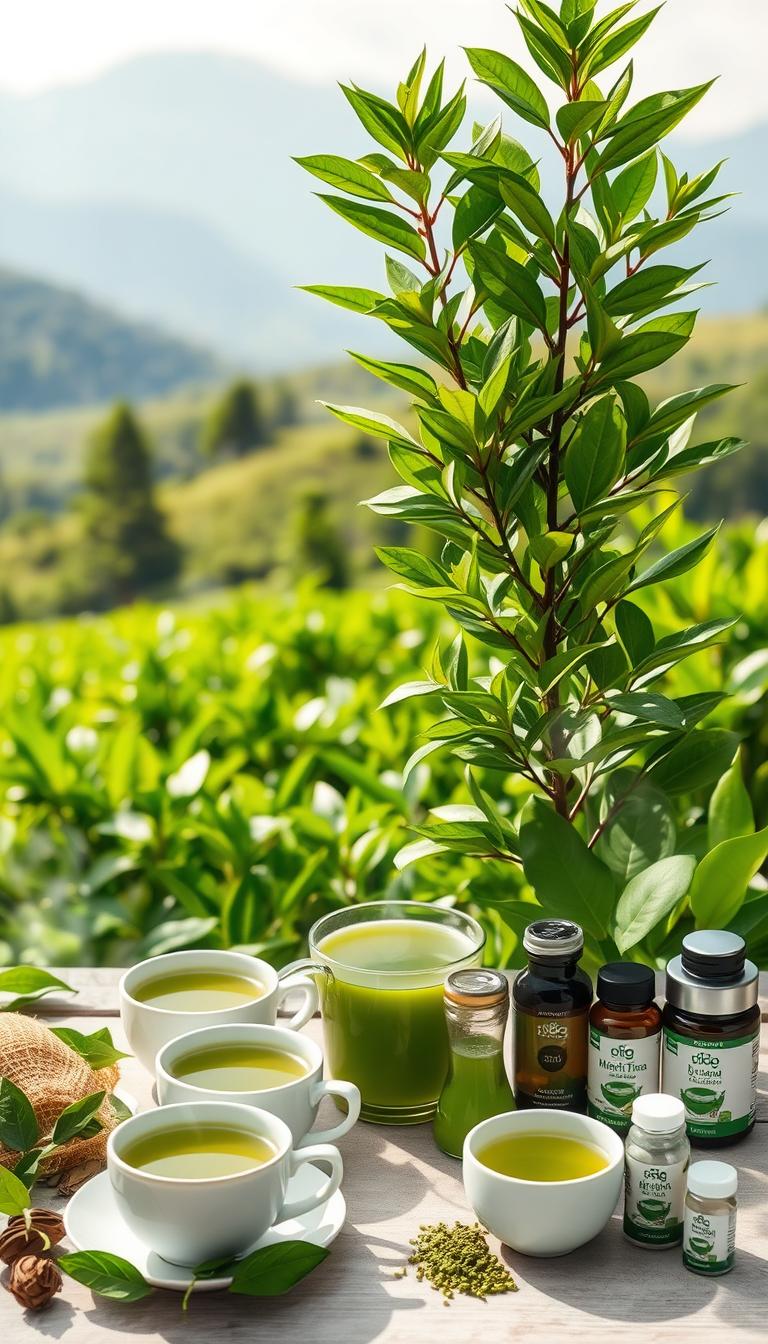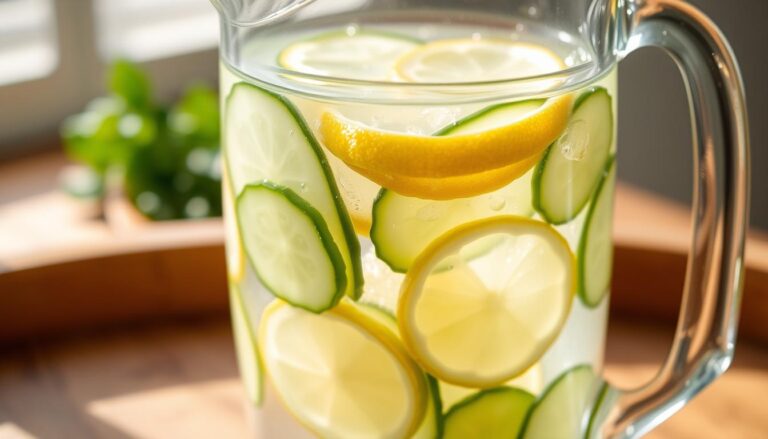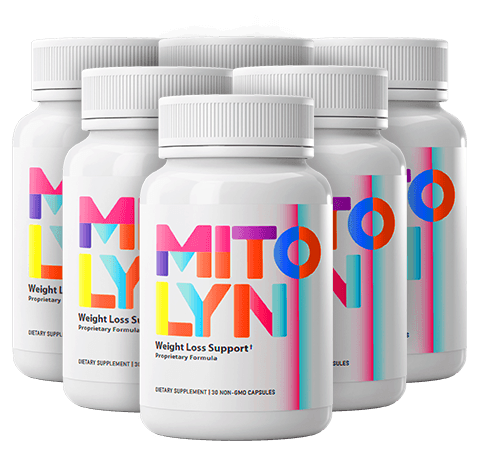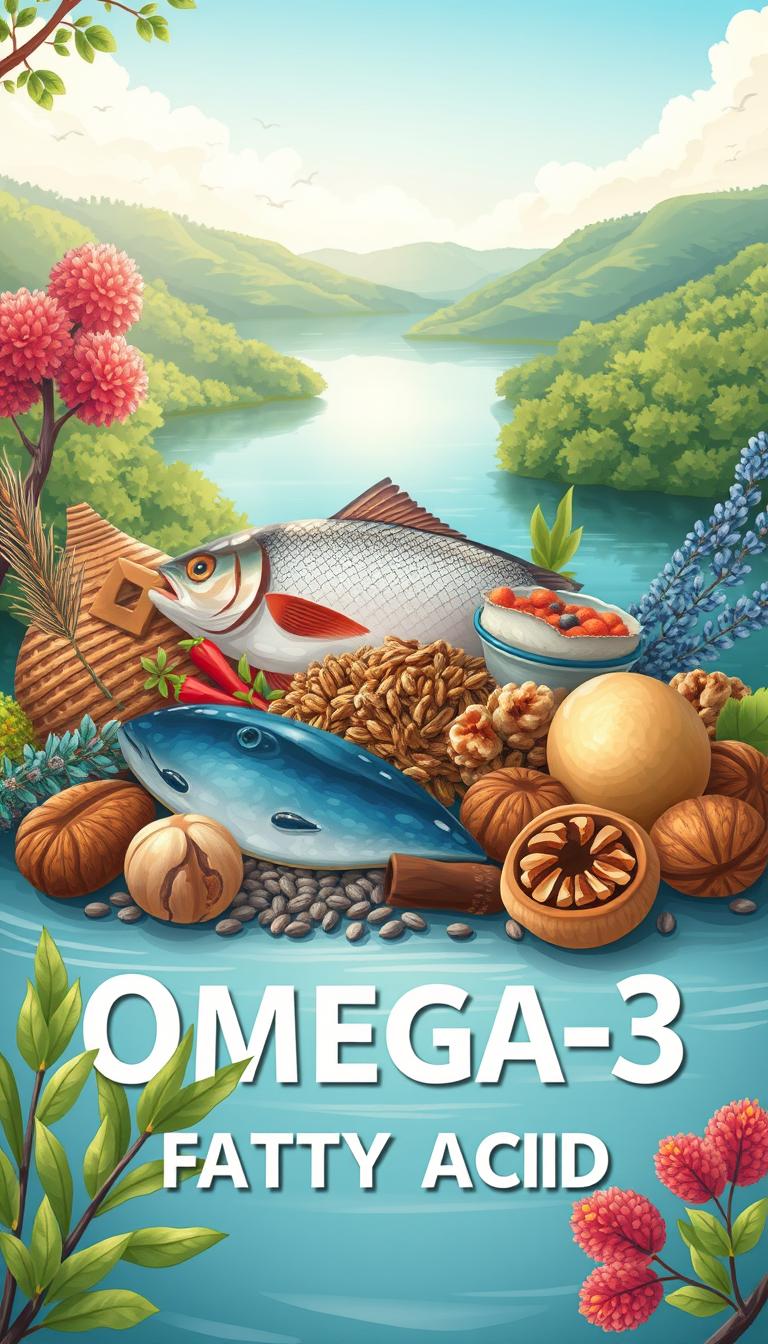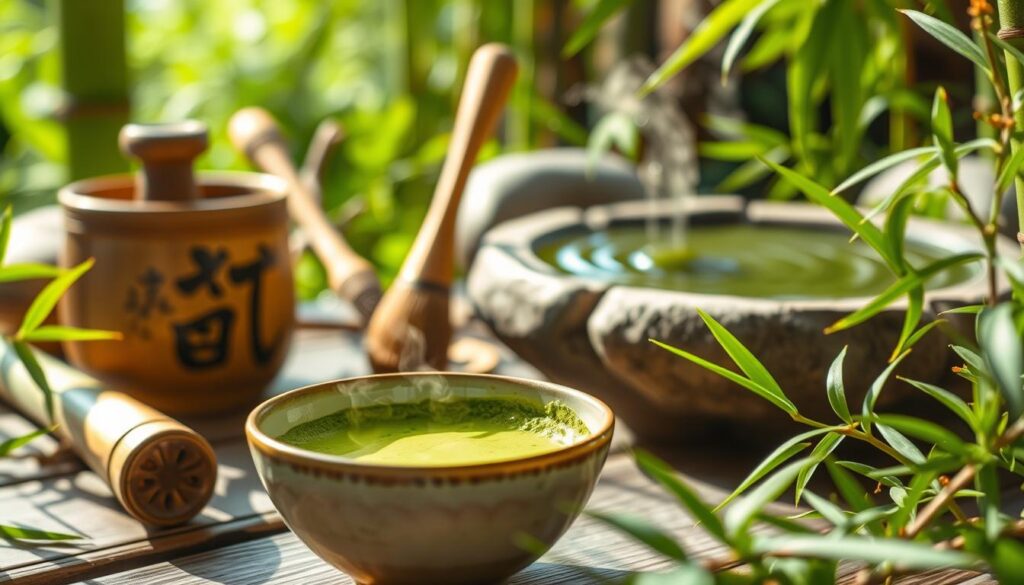
Imagine starting your day with a drink that energizes your body and sharpens your mind. It does all this without the crash of coffee. That’s the power of matcha. For centuries, this vibrant green powder has been loved in Japanese culture.
Now, its health benefits are changing lives all over the world. Unlike regular green tea, where nutrients stay in the leaves, matcha lets you drink the whole leaf. This unlocks a treasure of antioxidants and nutrients in every sip.
Think of matcha as nature’s multitasker. It boosts your metabolism and calms your mind. With 10x more antioxidants than standard green tea, it protects your cells. For those chasing wellness, studies show drinking 2-3 cups daily can help you lose 3 pounds in three months.
It also improves memory in older adults and reduces arthritis pain. It’s not just a trend—it’s backed by science.
Key Takeaways
- Matcha’s antioxidants outperform regular green tea by over 10 times.
- Drinking 2-3 cups daily may support weight loss and mental focus.
- Its unique L-theanine and caffeine combo fuels energy without jitters.
- Matcha may lower heart disease risk and improve cholesterol levels.
- Safely enjoy matcha benefits during pregnancy and beyond.
What Makes Matcha Different From Regular Green Tea
Matcha green tea has many benefits that regular green tea doesn’t. Its journey starts in the soil and spans centuries. It’s a superfood with a rich history.
Matcha’s history goes back to 8th-century China. But it really took off in Japan. Zen monk Myoan Eisai brought it to Japan in the 12th century. It became a big part of their culture.
Today, matcha is grown with great care. Unlike regular green tea, matcha plants are shaded for 20–30 days before they’re picked. This makes them very green and full of nutrients.
Matcha is special because you drink the whole leaf. This means you get all the nutrients. Regular green tea only gives you some of the good stuff.
- Matcha has 10x more antioxidants than regular green tea.
- A 2–3 oz serving of matcha has 70 mg caffeine, while regular green tea has 35 mg.
- Matcha gives you all the nutrients, unlike steeped tea.
Matcha is also balanced. It has L-theanine and caffeine together. This gives you focus without feeling jittery. Each cup of matcha is like a concentrated dose of nature’s best.
The Science Behind Matcha Benefits
Matcha tea benefits come from its special mix of plant compounds. These compounds are good for your health. You get all the nutrients from the leaf, unlike steeped tea.
Studies show how matcha’s compounds work together. They help your body in many ways.
- Epigallocatechin gallate (EGCG): This antioxidant fights free radicals. It helps reduce stress and aging.
- L-Theanine: It mixes with caffeine for calm focus. This improves your mental work.
- Catechins: Matcha has more catechins than green tea. They help with metabolism and protect cells.
- Caffeine: It gives steady energy. Studies show it helps with thinking.
| Compound | Matcha | Regular Green Tea |
|---|---|---|
| Catechins | Up to 137x higher | Lower concentrations |
| EGCG | Primary antioxidant, up to 60% of total catechins | Lower EGCG levels |
| L-Theanine | 44.65mg per serving | N/A |
| Vitamin C | 32–44.8mg/L | Less than half matcha’s levels |
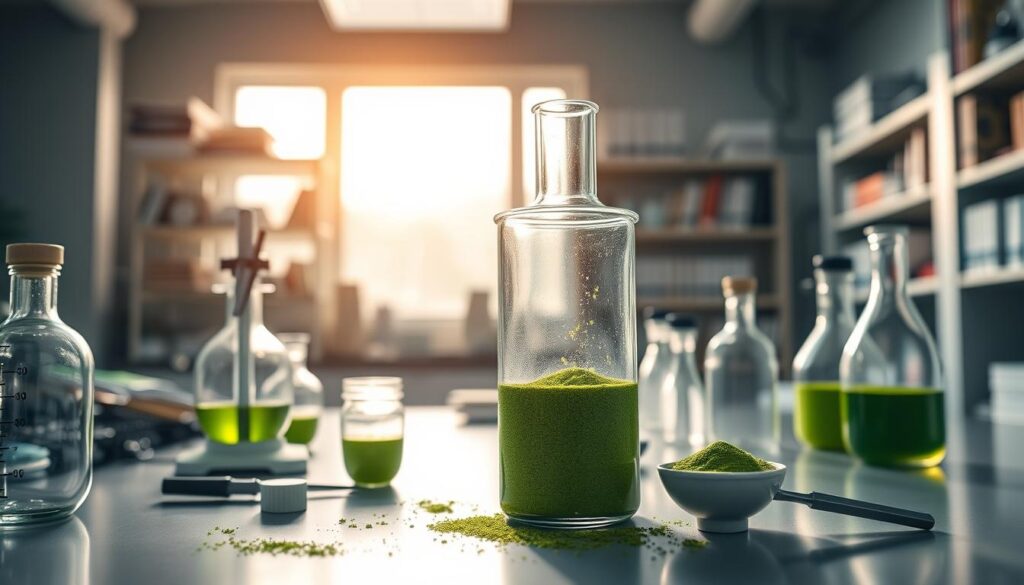
Studies show matcha improves focus and metabolism. People who drank 2–4g daily did better on tests. Animal studies saw less inflammation and better sugar use.
Theanine and caffeine work together for energy. EGCG fights inflammation. Matcha is great for mental clarity and health.
Powerful Antioxidant Properties of Matcha
Matcha antioxidants are a powerhouse of health support. They shield your body from daily environmental stress. These tiny compounds neutralize harmful free radicals, which can damage cells and accelerate aging. Let’s dive into what makes matcha’s antioxidants so unique.
Understanding Catechins and EGCG
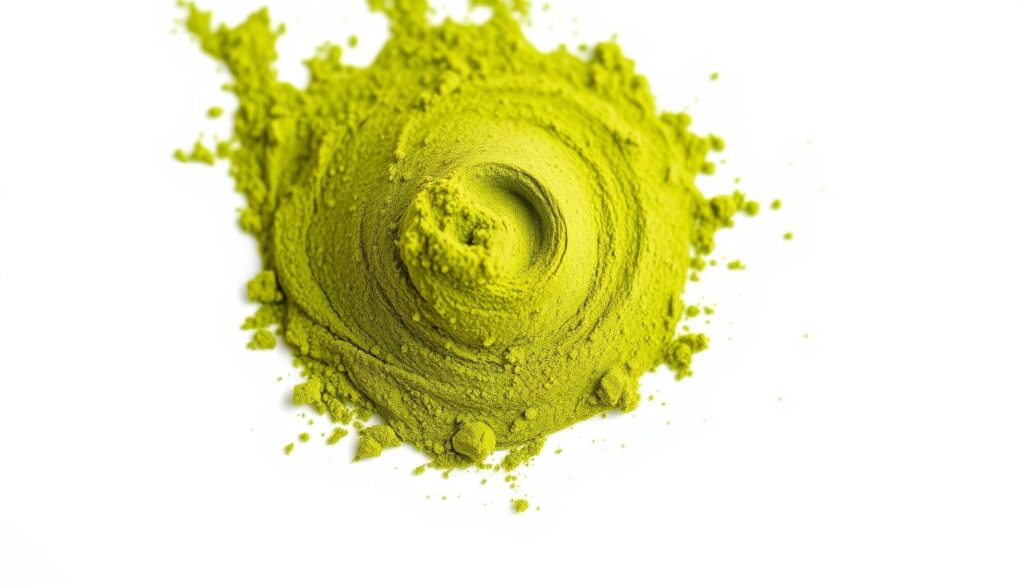
At the core of matcha’s strength are catechins, especially EGCG. This compound is linked to cancer prevention. Here’s why they matter:
- ORAC score of 1384 units/gram—137x higher than regular green tea
- 15x more antioxidants than blueberries, 125x spinach
- EGCG fights inflammation and may inhibit tumor growth
“Matcha’s EGCG content rivals pharmaceutical antioxidants in lab studies.”
How Matcha Fights Free Radicals
Free radicals trigger aging and disease. Matcha’s antioxidants neutralize them by:
- Scavenging unstable molecules before they damage cells
- Reducing oxidative stress linked to heart disease and diabetes
- Supporting liver health, per clinical trials
Studies show EGCG in matcha boosts detox enzymes. This enhances your body’s natural defenses.
Anti-Aging Effects on Your Body and Skin
These antioxidants don’t just protect internally—they rejuvenate your skin. Key benefits include:
- UV protection: Reduces sun-induced damage
- Increased skin elasticity and collagen support
- Vitamin C (44.8 mg/L) brightens complexion
Many users report a visible “matcha glow” after regular use. Its polyphenols and 1968.8 mg/L of flavonoids create a double defense against aging signs.
Matcha and Your Mental Clarity
Need sharp focus or a calm mind? Matcha offers a special advantage. It combines L-theanine and caffeine for clear focus without shakes. Unlike coffee, matcha’s steady energy keeps you sharp for hours.
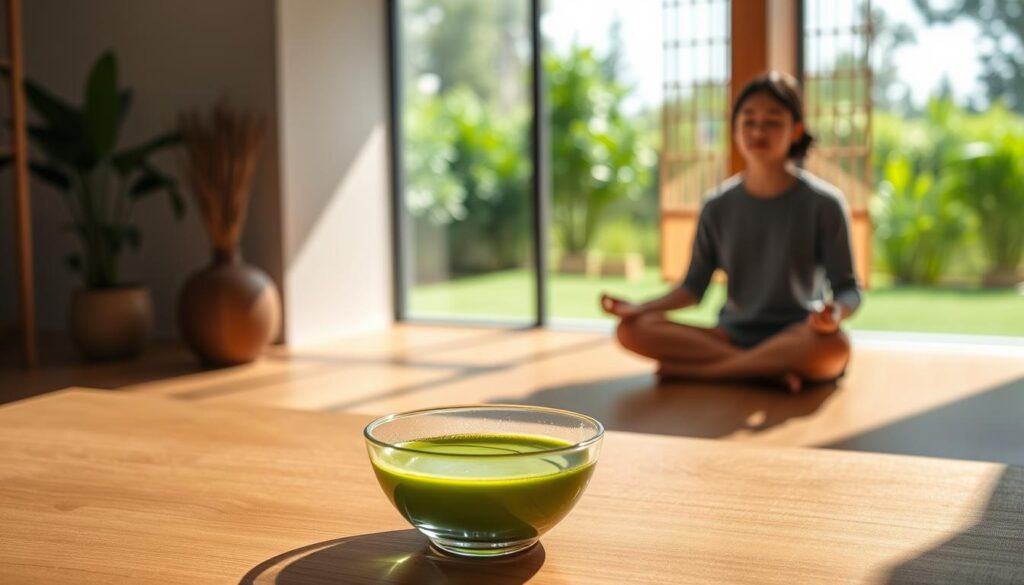
A study with 61 people showed matcha boosts memory and attention. Women saw a 1.95-point rise in tests compared to those who took a placebo. This means you think clearer and get things done faster, even on busy days.
- L-theanine in matcha boosts alpha brain waves, creating a relaxed yet alert state.
- Matcha drinkers often report better stress management and fewer mental fog moments.
- Lab studies show matcha may protect brain cells from oxidative stress linked to aging.
Matcha also improves your mood. Animal research shows it activates calm and focus areas in the brain. Human studies confirm its calming effects, though scientists are still finding the best amounts. Whether you drink it as tea or blend it into smoothies, matcha’s mental benefits are natural and lasting.
How Matcha Benefits Your Weight Loss Journey
Matcha is great for matcha weight loss goals. It has special nutrients that help your body. The matcha metabolism boost comes from natural compounds that help burn calories and reduce cravings.
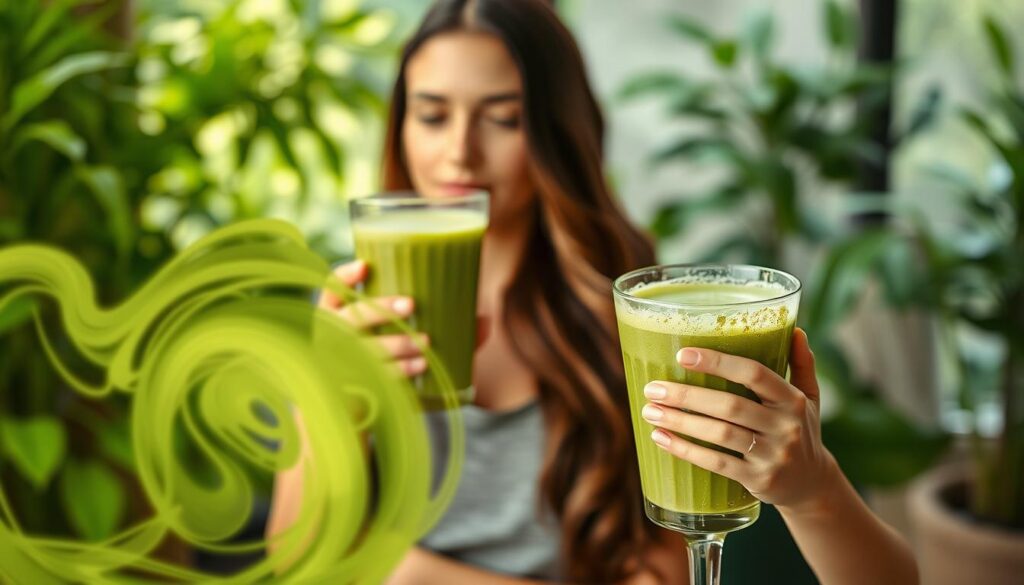
Matcha’s secret is its matcha metabolism power. It has more antioxidants than regular green tea. These antioxidants, like EGCG, work with caffeine to increase energy use by 4–8%.
This makes your body burn fat better. A study found this combo helps burn more calories, even when you’re resting.
Boosting Your Metabolism Naturally
Matcha also raises your metabolic rate by 3–5%. This means you burn more calories every day. Unlike other supplements, this boost is steady and safe.
Fat Oxidation and Calorie Burning
During exercise, matcha’s catechins turn fat into fuel. Research shows it boosts fat burning by 17% during workouts. Over 12 weeks, people lost 1–3kg and saw their waistlines shrink by 2–3cm.
Pair matcha with exercise for the best results.
Balancing Blood Sugar Levels
Matcha’s L-theanine helps control cravings by reducing blood sugar spikes. Studies show it lowers post-meal insulin spikes by 20–30%. This prevents hunger crashes and keeps your energy steady.
Start with one cup a day. Choose ceremonial-grade matcha for the most nutrients. Mix it with movement and mindful eating for a winning plan. Your body deserves natural support, and matcha gives it without harsh stimulants.
Energy Without the Crash: The Matcha Advantage
Feeling tired after your morning coffee? Matcha gives you a better matcha energy boost. It keeps you sharp without making you feel tired later. Unlike coffee, matcha’s mix of caffeine and L-theanine gives you calm energy that lasts.
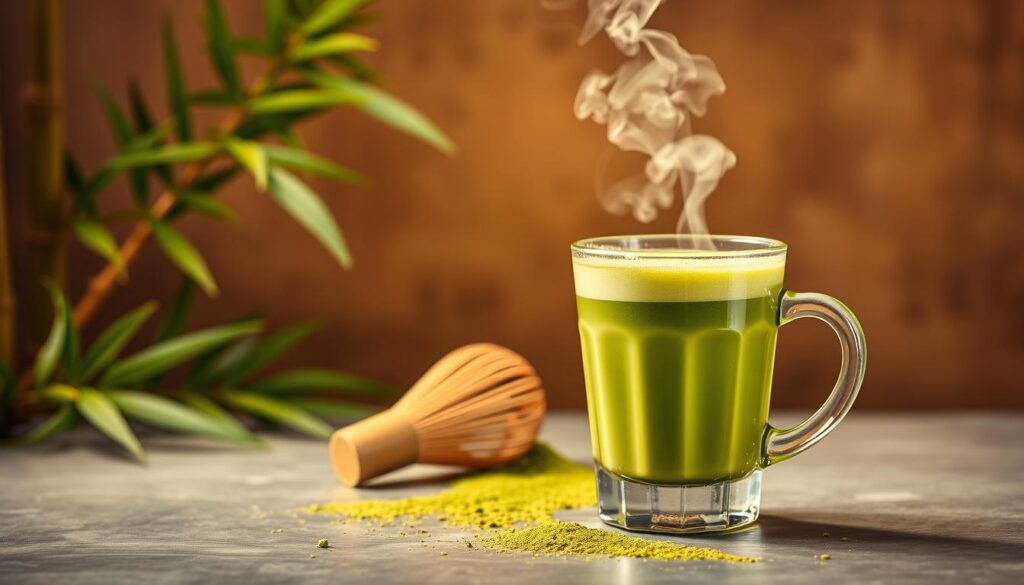
| Beverage | Caffeine per Serving | Energy Duration |
|---|---|---|
| Matcha | 35–70 mg (1–2 tsp) | 3–6 hours |
| Coffee | 95–165 mg | 1–2 hours |
- Slow-release energy: L-theanine slows caffeine absorption, avoiding the crash.
- Focus boost: A 2020 study found matcha drinkers improved attention by 20% over a placebo.
- Natural productivity: Steady energy supports sustained mental clarity for work or workouts.
Matcha has 19–44 mg of caffeine per gram. It works with L-theanine to create calm focus. This balance helps you stay focused longer without feeling tired.
Try 1–2 tsp daily (about 35–70 mg caffeine) for alertness without the crash. Choose high-quality matcha like Sweet Revolution’s Organic Ceremonial Matcha for a pure taste. Your body gets steady energy, not ups and downs.
Lesser-Known Matcha Health Benefits
Matcha is famous for its energy and antioxidants. But it has even more to offer. Discover matcha health benefits that can change your wellness routine.
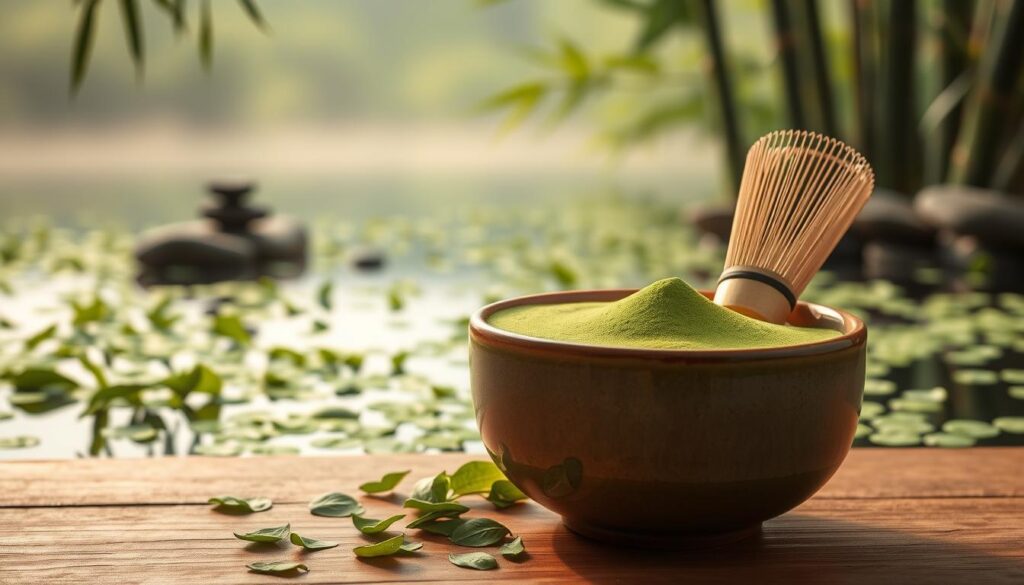
- Liver Protection: Studies show matcha’s catechins lower liver enzymes linked to fatty liver disease. This supports detox and improves organ function.
- Arthritis Relief: Matcha’s anti-inflammatory compounds stop cartilage damage. This eases joint pain and stiffness without needing medicine.
- Oral Health: Unlike coffee, matcha fights bacteria that cause cavities and bad breath. It naturally freshens breath and strengthens enamel.
- Immune Defense: Matcha is full of vitamins A and C plus chlorophyll. It boosts immunity, fights toxins, and makes skin stronger.
- Digestive Harmony: Matcha’s fiber and probiotic-friendly properties balance gut bacteria. This eases bloating and improves nutrient absorption.
Even a small amount, like a teaspoon in water or smoothies, unlocks these matcha health benefits. Enjoy it with mindful sipping to boost your overall wellness.
How to Incorporate Matcha Into Your Daily Routine
Adding matcha powder benefits to your day is easy. First, pick high-quality powder. Look for bright green, fine matcha. It should be labeled “ceremonial” for drinking or “culinary” for cooking. Stay away from dull colors or lumps.
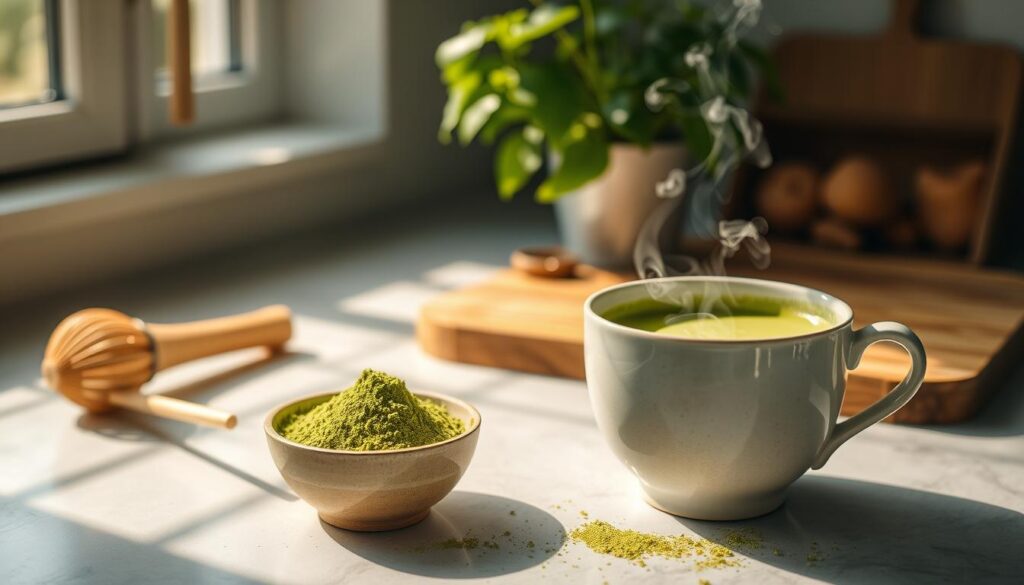
- Preparation Options:
- Traditional: Whisk ½–1 tsp with hot (not boiling) water for a classic bowl.
- Modern: Blend into smoothies, lattes, or oatmeal for a quick boost.
- Recipes to Try:
- Matcha smoothie: Mix with banana, almond milk, and spinach.
- Savory twist: Sprinkle on soups or stir-fries for umami depth.
- Baked goods: Add to muffins or cookies for antioxidants and flavor.
Drink 1–2 tsp (1–2 cups) daily for balance. Pro tip: Start small if you’re sensitive to caffeine. Pair it with a healthy diet for more benefits like energy boosts and focus.
“Aim for 1–2 servings daily to enjoy antioxidants and sustained energy without overdoing caffeine.”
Try different ways to enjoy matcha. Whether you sip it, bake with it, or blend it, it’s simple to make it a daily habit.
Conclusion: Transform Your Health With the Power of Matcha
Matcha is more than just a trendy drink. It’s backed by science and good for your mind and body. It has antioxidants like EGCG and L-theanine. These give you steady energy and focus without the crash.
Studies show matcha’s catechins reduce stress. Its amino acids also calm your nerves. Drinking it before a workout or adding it to smoothies can make it a daily habit.
Choose organic matcha to avoid harmful stuff. Drink 1–2 servings a day to keep caffeine levels right. Match it with yoga for better relaxation and recovery.
Matcha boosts your metabolism, heart health, and skin. It’s a mix of old traditions and new health goals. But remember, it’s part of a bigger picture. Eat well, move, and sleep well for the best results.
Ready to feel matcha’s energy? Start slow, try new recipes, and let matcha be your daily boost.




